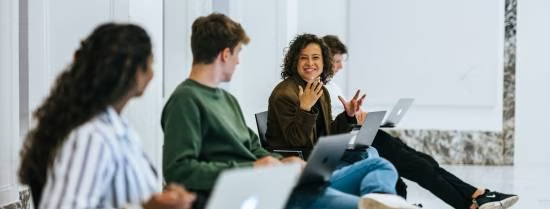A new format was created for the course 'Urban History: Rotterdam in a Global Perspective' last year. Physical lectures are now supplemented by knowledge videos made by professor Paul van de Laar, education advisor Esther Schut (Risbo) and Mirjam van de Woerdt, project manager at the Community for Learning & Innovation (CLI). "In the new lecture format, the aim is to challenge students. Using videos, quizzes and literature available in advance, we go straight into depth during lectures," says historian Van de Laar.

A different perspective on your profession
The transformed variant of Urban History was initially given to students who were physically in Rotterdam. Paul van de Laar says he had to look at his course in a completely different way. "Together with education advisor Esther Schut from Risbo, I set to work. We started by writing down all the material offered over eight weeks in scripts. We reduced everything to six-minute videos. They are short lectures, where I appear on screen with pictures. You need scripts because you can't improvise or digress, which of course I normally do."
"It takes a lot of time to make these videos, but you need that too if you want to do it well. We have a beautiful film studio on campus; very professional. In fact, all online lectures should be recorded there."
"Because we now cut up the material into short videos, we keep maximum attention during lectures"
Mirjam van de Woerdt
Projectmanager at Community for Learning & Innovation (CLI)
Discussion of content during lectures
"In my first lecture, I said: anyone who is not prepared and has not studied the material is not welcome. I hoped to encourage students to be really involved and we could really talk about the content. In practice, I had to scramble because the lecture was announced as a lecture," says Van de Laar.
"But because I had the videos as a framework, I had much more time and opportunity for in-depth discussion. Fortunately, there were some very motivated students. They pulled the whole group into the discussion. The nice thing about the videos is that students can always watch it back. What helped me is that scripting the recordings in advance also forced me to look at the material with different eyes. That is an added value and I can recommend it to everyone. It is a form of education we are gradually moving towards. I believe this is the future."
Miriam adds: "You used to have a lecture where a student would listen for three hours. Because we now cut up the material into short videos, we keep maximum attention. You also try to give an assignment in the video. A quiz or a group assignment resulting from it. The video does not stand alone, but it is really part of the curriculum. With the help of educational advisors from Risbo, we make sure the teaching is activating and students are challenged."

Taking courses at other universities without travelling there
The request to transform the course into a more online variant came from UNIC. Erasmus University Rotterdam is part of this European alliance of ten universities. The ultimate aim is that students from other universities can take courses with us online from the comfort of their own home, i.e. without being in Rotterdam.
"An online course is of course something completely different from an offline traditional course. You can get a taste of another university this way without having to travel there. This is also an advantage in terms of sustainability. It is a low-threshold way to get a taste of a foreign university," Mirjam van de Woerdt says. "At the Community for Learning & Innovation, we support all faculties in teaching innovation and quality improvement of education. Online education is not just recording a lecture and throwing it over the fence."
What is UNIC?
UNIC is a European alliance of ten universities located in so-called post-industrial cities. UNIC's mission is to have a positive impact on the development of post-industrial cities through inclusive education, innovative research and the involvement of local partners.
See which universities are affiliated to UNIC
"We may soon have three or four variants of education to choose from"
Paul van de Laar
Professor & historian

Next step: full online version
Mirjam hopes that the Urban History course can also be offered fully online next time and that students from other UNIC universities will register. "We hope that there will then be separate online working groups where discussions can be held," she says.
There is still work to be done before the course can be taught entirely online, according to Paul. "Often cameras are blacked out because there is a poor internet connection. How do you make sure there is interaction? Are you going to work with mentimeter? We have to think about that carefully. That's a task for next time."
Mirjam and Paul both do believe in this combination of online and physical education. "I think the choice is important. On-campus education works better for some and online education works better for others. And probably many students actually like the combination of both. It is difficult to find accommodation here, but this way you can still get acquainted with education at our university," Mirjam says.
Paul concludes, "We are moving much more towards a hybrid form of education. We may soon have three or four variants of education to choose from."
- Researcher
- More information
All about subject conversion and quality improvement in education can be found on the pages of CLI.
Or

